Many cultures in the world thrive on rice. It’s their staple food. Despite eating rice daily (sometimes even three times per day), it’s uncommon to see people struggle with excess weight.
Today I will explain what are the advantages and disadvantages of eating white rice every day, whenever you want to gain or lose weight.
As a whole, you can eat rice every day because it’s a good source of fast-digestive carbohydrates that gives you instant energy. White rice can be mixed with a variety of foods, it’s widely available, and it’s a rich source of vitamins and minerals that are essential for the body. However, it’s not for everyone.
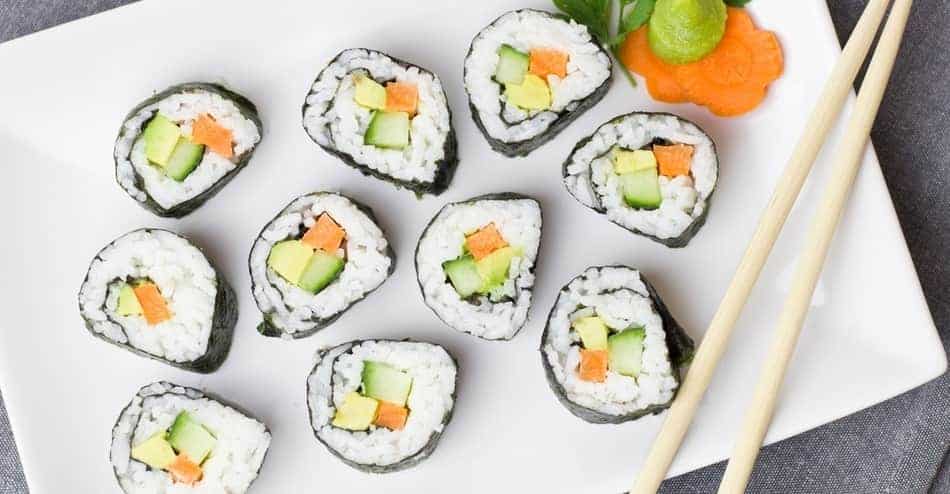
If like me you love rice then this article will hit home with you.
What Happens If You Eat Rice Every Day?
I think white rice is the most versatile food out there. However, what happens if you want to eat this staple food every day?
Overall, if you eat rice every day you will have a lot of energy because starch hydrolysis in white rice is fast, therefore it provides instant access to glucose. Due to the lack of bran from the outer layer of rice, white rice has a higher gastric emptying rate which helps with digestion.
White rice is a great source of fast digestive carbs. This means it will give you tons of energy in a short period of time.
Compared to brown rice, white rice digestions happen almost instantly when the gastric juices can disintegrate and extract maltose from the starch in the process of starch hydrolysis (source).
See the graph below.
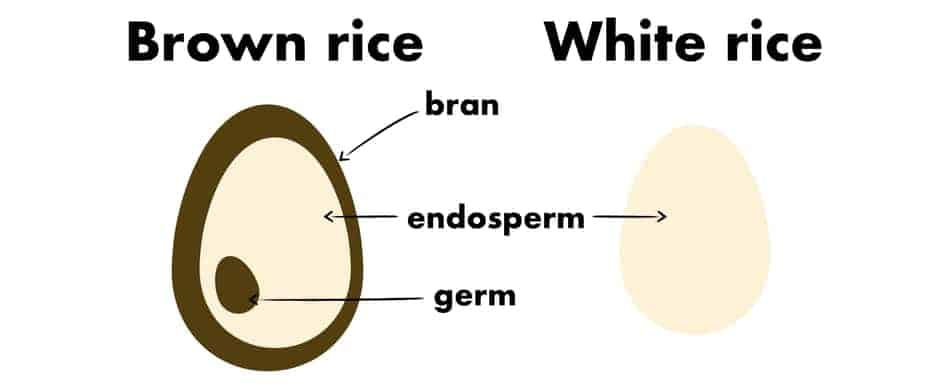
Here you can see the comparison between brown and white rice. The difference between white and brown rice is that white rice doesn’t include bran (rich in dietary fiber) and germ.
Removing bran allows for maltose to be immediately broken down by amylase and lipase (two digestive enzymes) into the glucose and start the absorption process.
On the other hand, eating brown rice with all the bran that is surrounding the outer layer, delays the process and slows down digestion.
What Happens If You Eat Only Rice?
If you only eat rice, your body will lose a lot of weight, mainly due to the muscle protein breakdown. Eating only white rice doesn’t provide all of the essential nutrients like proteins, fatty acids, vitamins, and minerals, therefore, the longer you eat just rice, the weaker you will get.
Other Benefits Of Eating Rice Everyday
Recently I came across a fascinating study published by Minori Koga, Ph.D., a researcher from Hokkaido University Graduate School of Medicine in Sapporo. In his research, Dr. Koga and his colleagues documented a correlation between sleep quality and rice consumption.
Dr. Koga said that the present study suggests that rice consumption may be a factor in the improvement of sleep quality. He also added that noodle consumption has been associated with poor sleep quality.
According to Dr. Koga, a rice-centered diet may reduce oxidative stress, which is believed to affect circadian rhythms.
Can Eating Rice Every Day Cause Diabetes?
Recently, there’s been a lot of research published that illustrates the association of white rice with the risk of diabetes.
Dr. Balaji Bhavadharini from the Population Health Research Institute in Canada published a prospective cohort study that involved 132,373 people from 21 countries.
Below you can see the table that shows the association between eating white rice with the incidence of diabetes.
The numbers are based on the grams of rice eaten per day.
| Eating Rice Every Day | <150 g/day | 150 to 300 g/day | 300 to 450 g/day | ≥450 g/day |
|---|---|---|---|---|
| Total group | 71,914 people | 16,976 people | 14,010 people | 29,473 people |
| Diabetes events | 2,960 | 922 | 628 | 1,619 |
The overall results have shown that “higher consumption of white rice is associated with an increased risk of diabetes, which was most marked and driven by the strong association seen in South Asia” (Bhavadharini B, 2020).
Can eating rice everyday cause diabetes? As a whole, studies have shown that eating rice every day can cause diabetes. However, some countries like China reported different results, likely due to the fact that the vegetables, pulses, and meat consumed with the rice reduce the glycemic index of the rice alone.
In other words, eating just rice can very likely spike insulin and increase glucose levels. However, remember that you rarely eat rice on its own.
Take a look at the graph below.
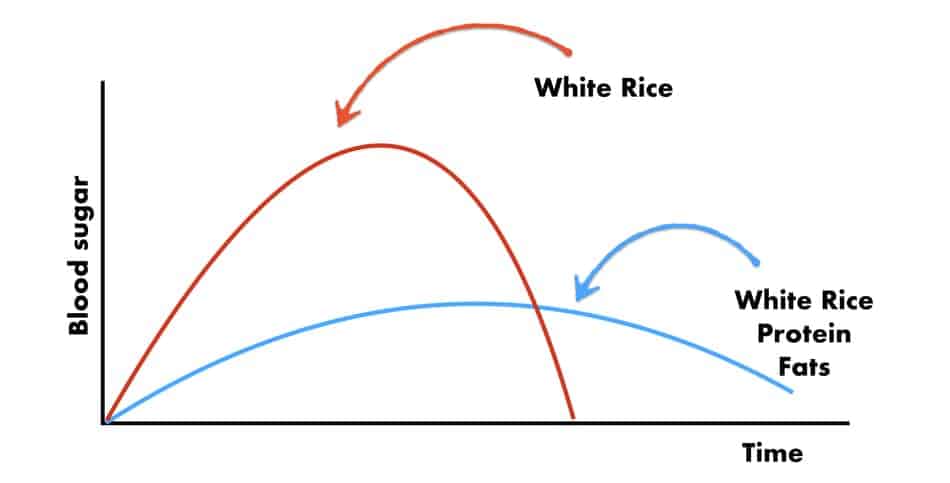
In the graph above you can see the postprandial glucose spikes after eating white rice alone (red line) versus eating white rice in combination with proteins and fats (blue line).
As you can notice, the postprandial glucose release is significantly slower when you combine rice with other macronutrients.
Having additional food, ideally, some type of protein will slow lower the insulin but will keep the instant energy in the bank. This is great news if you’re looking for food that gets you going for the day.
Related article: Can I Eat Chicken And Rice Everyday?
Does Eating Rice Everyday Make You Gain Weight?
Overall, eating rice every day as a part of a well-balanced nutrition plan doesn’t make you gain weight. Rice is low-calorie-dense food with a high-satiety score. High satiety means you can satisfy your hunger with a smaller serving of food, therefore, it helps you eat to get full by eating less food.
Dr. Zhuoshi Zhang from the University of Otago in New Zealand compared the satiety score between eating rice, bread, and pasta.
See the graph below.
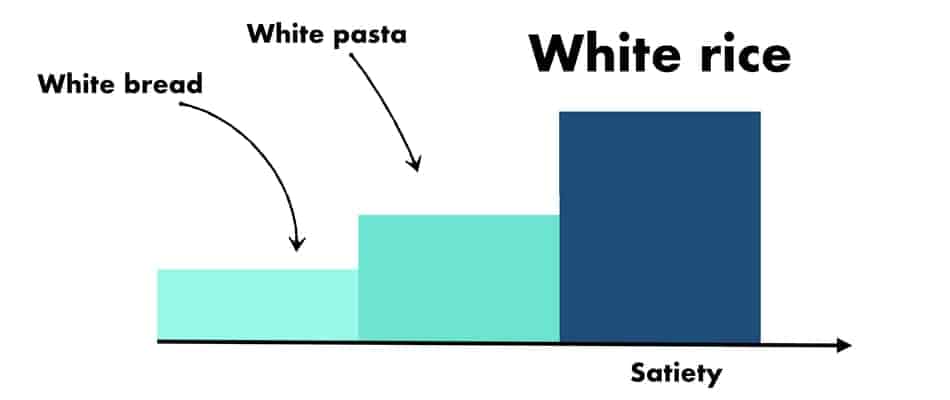
The results have shown that people had higher satiety, lower hunger, and higher fullness after eating rice, compared to pasta or bread (Zhang et al. 2018).
Rice belongs to a group of foods that are high in satiety. This means you just need a little bit to feel full. Think of it when you eat sushi. All you need is a couple of pieces to feel full.
How To Eat Rice Every Day And Not Gain Weight
Overall, to eat rice every day and not gain weight you need to mix it with other foods to lower your glycemic index. You also should start eating when you’re physically hungry and stop eating when you’re satisfied, or no longer hungry. You should not stop eating when you’re completely full.
This way you can eat rice even 3 times a day and still don’t worry about gaining weight.
The problem is when people overeat. Because it’s easy to keep on eating until we feel 100% full. But that’s not when you should stop eating.
Below you can see the graph that compares when we stop eating versus when we should stop eating.
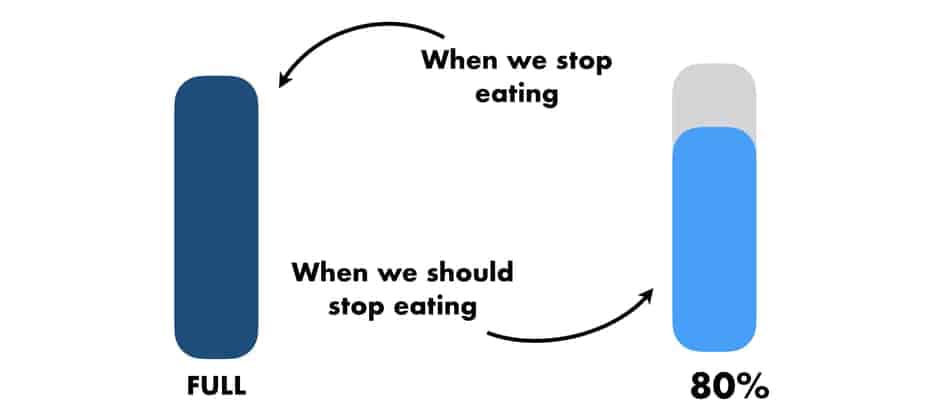
- You should stop eating when you’re satisfied, not full.
- You should eat until no longer hungry. It’s a big difference.
The simple trick to stop overeating is to eat slowly. Its takes around 20-minutes for satiety to kick in.
So if you eat slowly, when you purposefully stretch out the mealtime, you will get full, halfway through the meal (source).
Sounds too simple?
Use the checklist below for your next meal and see how powerful simplicity can be. This way not only you won’t gain weight, but you can lose weight.
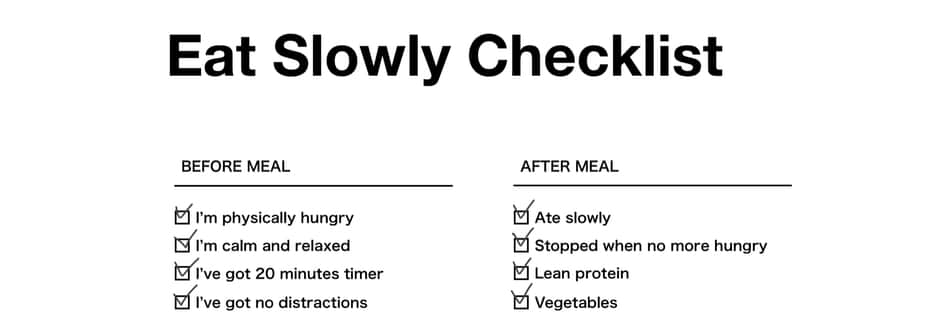
Can I Eat Rice Every Day And Lose Weight?
You can eat rice every day and lose weight because weight loss is driven by a caloric deficit. Even if you eat rice every day, but your overall calorie intake is below daily calorie expenditure, it will trigger the body to switch from an external source of energy to an internal source of energy.
There are people who only eat plants and lose weight. There are also people who only eat meat and lose weight. And there are people who eat rice all day long and don’t have a weight problem, too. So to lose weight is not about eating rice or not.
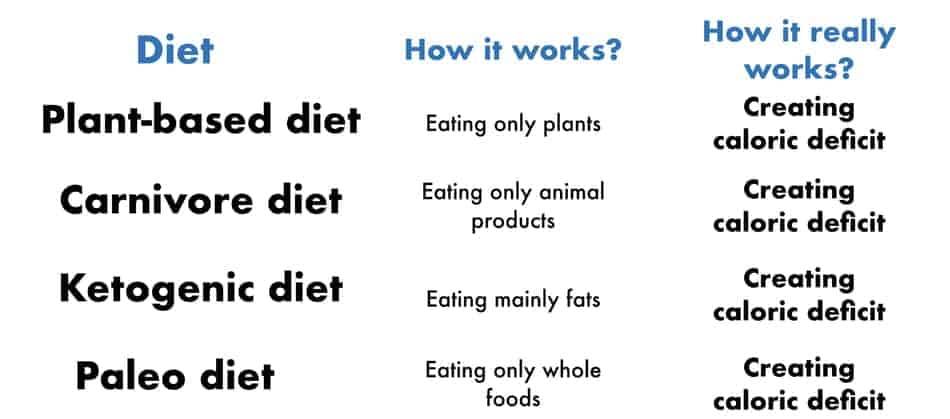
So the specific food item (of the lack of it) isn’t the main driver behind weight loss. It’s the total food amount. So really it doesn’t matter what you ea. As long as you eat less, you will lose weight.
The easiest way to lose weight, apart from eating slowly, is to journal what you eat (source).
If you don’t want to count calories (I don’t) then the easiest way is to track what you eat. You can have a specific journal, or just pen and paper will do.
Here is an example of a meal journal.
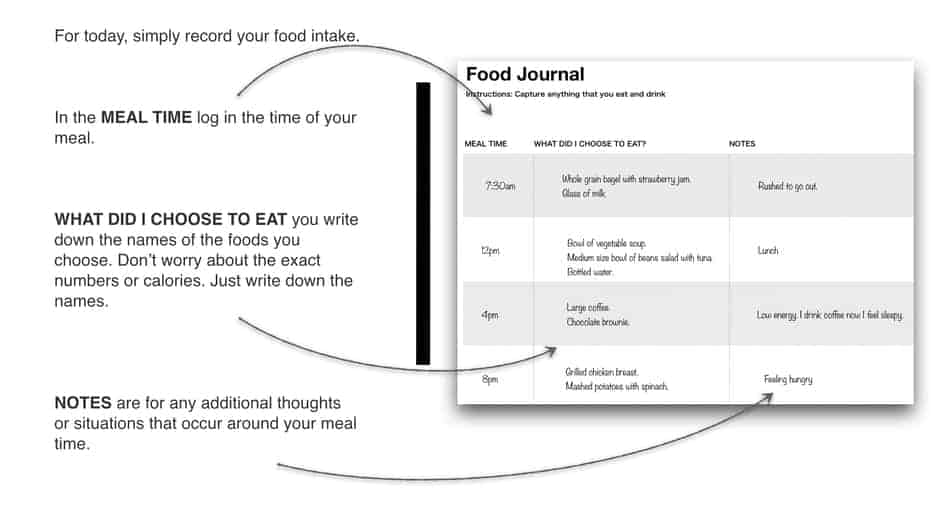
The simple act of writing down what we eat is enough to trigger self-awareness. And self-awareness is sometimes all you need to make a change. It’s like seeing a credit card bill after a night out.
At the time you may be distracted, but once you got it in front of you, know you pay attention. The same goes for writing down what we eat.
How Much Rice Should I Eat A Day To Lose Weight?
In general, you can eat up to 150g of rice a day and still lose weight because weight loss is triggered by calorie restriction from the total amount of food you eat over a long period of time. Therefore if you eat rice even three times a day, but your overall number of calories is low, you will lose weight.
You can eat rice for breakfast, lunch, and dinner, and still lose weight. It doesn’t matter. What matter is when you press the stop bottom.
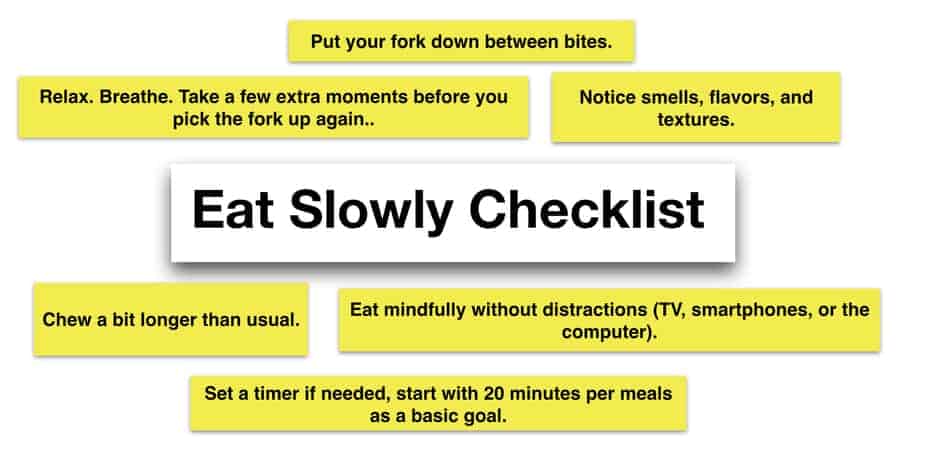
So focusing on eating less, slowing down, and even timing yourself during your meal will help you not only enjoy the rice as often as you want. But it will get you the results that you want, too.
Plus, eating slowly also enhances your nasal chemosensory, olfaction, and food palatability. In other words, when you eat slowly, food tastes better (source).
Will I Lose Weight If I Stop Eating Rice?
You won’t lose weight if you stop eating rice because weight loss is driven by a caloric deficit, not by the rice deficit. This means if you stop eating rice, but your overall calorie intake still exceeds daily calorie expenditure, you will gain weight, despite not eating rice.
So it’s not about not eating rice. It’s about less food overall But here’s the problem.
We all know that weight loss is about eating less. But eating less is very subjective. What does it even mean to eat less? Less than what?
So we use external tools to “measure” the foods like counting calories, portion sizes, weighing foods on the scale, or counting points. And that works. For some people. Sometimes.
But for the rest of us, it’s a pain in the ass. So it’s much easier to just abandon some foods completely and get over with it.
“Let me just stop eating rice and I will lose weight”
But that doesn’t make the problems go away. If someone is overeating on rice, or pasta or any type of food, removing this food will cause overeating on something else instead. So the rice is not the problem. Overeating is the problem.
Please remember that there are many reasons why people eat food, not only to satisfy hunger. It’s usually to reduce stress (source).
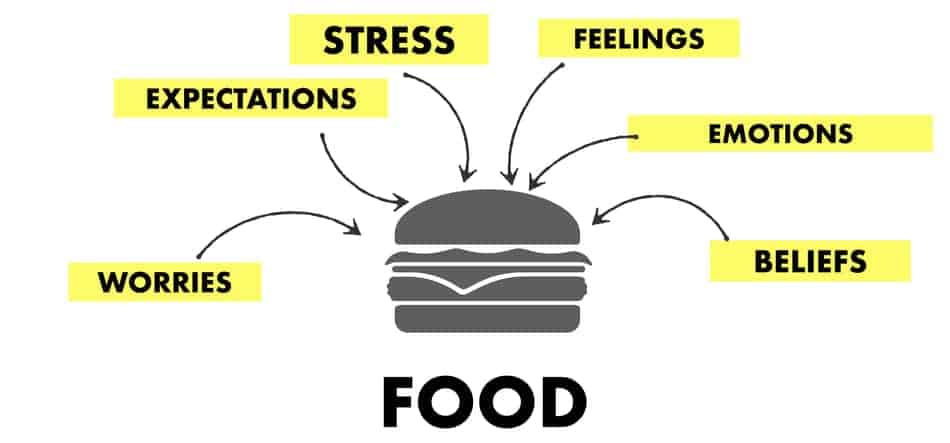
So if we use food to regulate our stress, regardless if we eat rice or not, we will still keep doing what we’ve been doing. To learn more about how to stop overeating, check out my related article where I listed the step-by-step process of how you can stop overeating.
Conclusion
As you can see, it’s ok to eat rice daily without the worry about gaining weight. In fact, if you will spend a little extra time on how to eat versus what to eat, it will not only change your relationship with food, but it will help you get rid of some of the most common beliefs and misconceptions around rice.
You cannot eat only rice because rice doesn’t contain enough proteins, amino acids, vitamins, and minerals.
Proteins are the most versatile macro elements that serve crucial functions in all biological processes, including protein synthesis, growth, and cellular differentiation.
